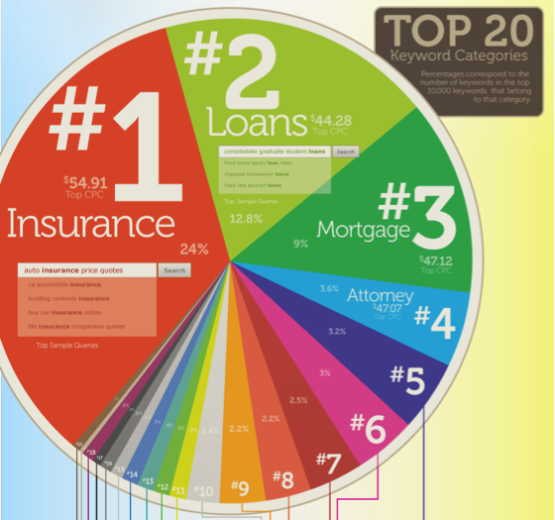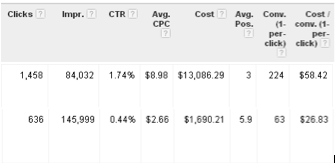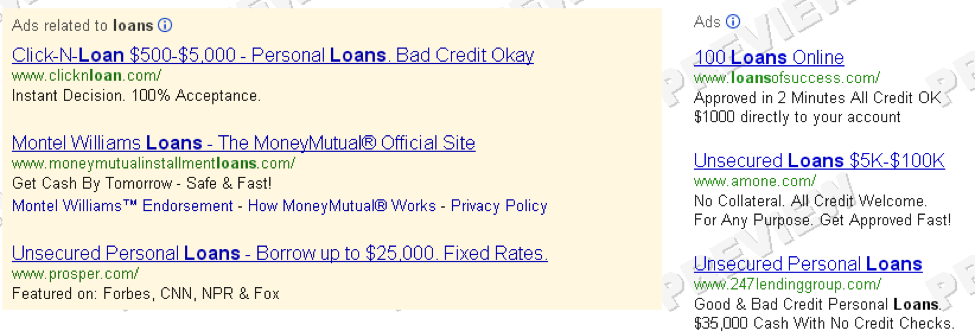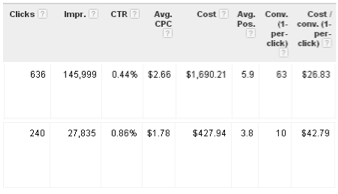Today’s post is from PPC Hero Ally, Jacob Sterrett. Jacob Sterrett is the digital marketing specialist for Pioneer Services. Jacob graduated from Northwest Missouri State University with a double major in Business Management and Marketing. He has been working in the PPC field for two years and he is Google and Bing certified in paid search.
—
There are plenty of small business and niche markets out there wondering how to compete for hyper-competitive terms against big competitors. You have your core set of producing keywords that fit your niche or business, but there are still conversions out there. You just have to know how to compete to get them. Below are the most expensive keywords in Google and I happen to be in a niche market in category #2: loans. I am only looking for a small piece of a huge, expensive pie so I have to be smart about how I get those extra conversions.

Here are some tips and strategies that can level the playing field:
1. Split out costly keywords into their own campaigns – When I took over the account broad loan keywords were mixed in with our core converting campaigns. This driving up costs, while taking down the CTR of the overall campaign due to big impression numbers and low clicks for these keywords. Additionally it hurt overall quality scores creating additional costs for our main keywords. Why not negative out these keywords? Because there is opportunity out there to get additional conversions from them, so we moved them into their own campaign and adopted new conversion goals that were completely different from our core campaigns. After making these adjustments, quality scores for core keywords went from 6s and 7s to mostly 10s. This can work for you as well.
2. Know your limitations – This one is pretty obvious, but it’s the most important one. You have to know how much you want to pay for a conversion. If you are going after a very competitive term, like” loans” you have to set a CPA 50 to 60% below your normal CPA goal. This is to account for the fact that as a niche advertiser competing in huge pool of people that aren’t eligible for your product or service, you are going to get a ton of unqualified clicks. You have to expect and accept this as is part of the game you are playing here. Below is one example:
The top is our core campaign and the bottom is the broader and more expensive keyword campaign. As you can see, we have a totally different bidding structure for each of these campaigns. To be effective as a niche marketer or small business you have to balance position with an effective CPA goal.
One strategy to test when going after an expensive, high-impression keyword is to keep your bid and position low. You can still get tons of impressions and clicks by being in a lower position because there are so many searches for this keyword. You don’t have to be in the top couple of positions to see conversions.
3. Make your ad stand out to your niche – With high competition keywords there is going to be a lot of repetitive ad copy between companies. This is where you can stand out and target your audience with a focused title and destination URL. This is where you can ditch using Dynamic Keyword Insertion in your title and aggressively go after your audience. For example, look at this sample SERP for the keyword “loans”:
These ads say a lot of the same thing about Unsecured Loans. This is the perfect opportunity to stand out from the crowd. If my demographic was college students that needed a personal loan, I would write an ad that would stand out to them. This can work with your small business name as well. If you don’t get a click you are still getting impressions to help out with your branding.
4. Don’t be afraid of mobile – As Google rolls out their new enhanced campaigns, you will have to deal with mobile – whether you want to or not. No fear, it’s not a bad thing if you are in a niche market or small business. The competition for mobile keyword terms is not as high on mobile as it is on desktop. Plus, even after the enhanced campaigns come out, there still should be enough margin to make mobile worthwhile. Given how the mobile SERPs are laid out, you can get a higher CTR on your mobile terms than desktop. Below is an example of what I am talking about:
The top is our expensive keyword campaign and the bottom is the mobile version of that same campaign. Notice how the CTR is double and CPC is 33% less on the mobile campaign than desktop? It doesn’t convert as well as desktop does, but there is still enough there to make it worth running.
I would recommend having a mobile website, but if you don’t have the means there is another way to compete in the mobile world. Having a mobile focused ad copy is a great way to have your ad stand out from your competition.
Just by making an ad mobile focused resulted in a 64% increase in CTR.
Just because you don’t have the PPC budget that the big companies have doesn’t mean that you still can’t compete and win in paid search.








